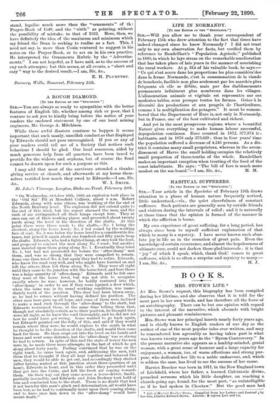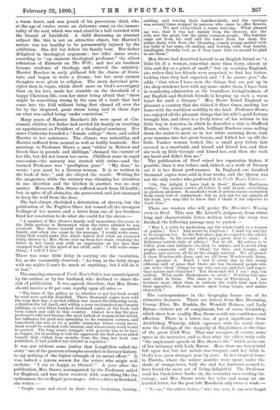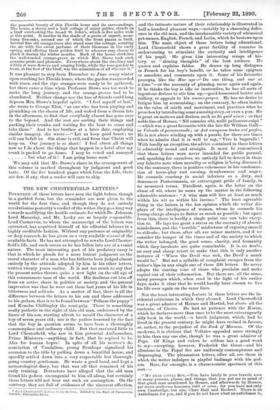BOOKS.
• MRS. STOWE'S LIFE.*
AT Mrs. Stowe's request, this biography has been compiled during her lifetime, and she observes that it is told for the most part in her own words, and has therefore all the force of an autobiography. There can be but one opinion with regard to the interest of the narrative, which abounds with bright pictures and pleasant reminiscences.
Mrs. Stowe won her principal laurels nearly forty years ago, and is chiefly known to English readers of our day as the author of one of the most popular tales ever written, and may be remembered less agreeably as having taken part in what, was known twenty years ago as the "Byron Controversy." In the present narrative she appears as a healthy-minded, genial woman, with a great sense of humour and a large capacity for enjoyment, a woman, too, of warm affections and strong pur- pose, who dedicated her life to a noble endeavour, and, which is seldom the case, has lived to see the success of her cause.
Harriet Beecher was born in 1811, in the New England town of Litchfield, where her father, a learned Calvinistic divine, preached sermons which his little daughter, on reaching a church-going age, found, for the most part, " as unintelligible as if he had spoken in Choctaw." But the good man had.
• Life of Harriet Beecher Store. Compiled from her Letters and Journal-, ki- ller Son, (Aeries Edward Stowe. London: SImpson Low and Co. a warm heart, and was proud of his precocious child, who at the age of twelve wrote an elaborate essay on the immor- tality of the soul, which was read alond'in a hall crowded with the literati of Litchfield. A child discussing an abstract -subject like this- is not an attractive object, but Harriet's nature was too healthy to be permanently injured by the exhibition. She did but follow the family bent. Her father delighted in theological argument ; her elder sister wrote, according to " an eminent theological professor," the ablest refutation of Edwards on The Win; and her six brothers became students of theology, and entered the ministry.
Harriet Beecher in early girlhood felt the charm of litera- ture, and began to write a drama; but her most earnest thoughts were given to religion. The stern doctrinal prin- ciples then in vogue, which dwelt more on God's sovereignty than on his love, made her stumble on the threshold of a happy Christian life, even her sister being afraid that " there might be something wrong in the case of a lamb that had come into the fold without being first chased all over the lot by the shepherd, great stress being laid in those days on what was called being under conviction.' " Many years of Harriet Beecher's life were spent at Cin- cinnati, whither her father had carried his family on receiving an appointment as President of a theological seminary. Her sister Catherine founded a " female college " there, and called Harriet to her assistance. The climate was unhealthy, and Harriet suffered from mental as well as bodily lassitude. Her marriage to Professor Stowe, a man "richer in Hebrew and Greek than in pounds and shillings," changed the current of her life, but did not lessen her cares. Children came in rapid succession—the nursery was started with twins—and the learned Professor was " prodigious poor." " My dear," he wrote, " you must be a literary woman. It is so written in the book of fate; " and she obeyed the oracle. Writing for the magazines, while the nursery was claiming her attention in one direction and the kitchen in another, was no easy matter. Moreover, Mrs. Stowe suffered much from ill-health ; but, in spite of all obstacles, she persevered, and just managed to keep the wolf from the door.
She had always cherished a detestation of slavery, but the publication of the Fugitive Slave Act roused all the strongest feelings of her nature, and a letter from one of her brothers fixed her resolution to do what she could for the slaves :— "A member of Mrs. Stowe's family well remembers the scene in the little parlour in Brunswick when the letter alluded to was received. Mrs. Stowe herself read it aloud to the assembled family, and when she came to the passage, I would write some- thing that would make this whole nation feel what an accursed thing slavery is,' Mrs. Stowe rose up from her chair, crushing the letter in her hand, and with an expression on her face that stamped itself on the mind of her child, said : I will write some- thing ; I will if I live.' " There was some little delay in carying out the resolution, for, as she reasonably observed: " As long as the baby sleeps with me nights I can't do much at anything; but I will do it at last."
The amazing success of Uncle Tom's Cabin was unanticipated by the author, or by her husband, who declined to share the risk of publication. It was agreed, therefore, that Mrs. Stowe should receive a 10 per cent. royalty upon all sales :- " The fears of the author as to whether or not her book would be read were quickly dispelled. Three thousand copies were sold the very first day, a second edition was issued the following week, a third on the 1st April, and within a year one hundred and twenty editions, or over three hundred thousand copies of the book, had been issued and sold in this country. Almost in a day the poor professor's wife had become the most talked-of woman in the world, her influence for good was spreading to its remotest corners, and henceforth she was to be a public character whose every move- ment would be watched with interest, and whose every word would be quoted. The long weary struggle with poverty was to be hers no longer; for in seeking to aid the oppressed she had also so aided herself, that within four months from the time her book was published, it had yielded her $10,000 in royalties."
It was not without some justice that Longfellow called the story " one of the greatest triumphs recorded in literary history, to say nothing of the higher triumph of its moral effect." It was, indeed, a joyous season. for the writer, who might well exclaim : "I am so happy, so blessed !" A year after the publication, Mrs. Stowe, accompanied by the Professor, sailed for England, and was there received with something like the enthusiasm due to Royal personages. After a drive in Scotland, she writes :— " People came and stood in their doors, beckoning, bowing,
smiling, and waving their handkerchiefs, and the carriage was several times stopped by persons who came to offer flowers. We met everywhere a warm welcome. What pleased me was, that it was not mainly from the literary, nor the rich, nor the great, but the plain, common people. The butcher came out from his stall and the baker from his shop, the miller dusty with flour, the blooming, comely young mother with her baby in her arms, all smiling and bowing, with that hearty, intelligent, friendly look, as if they knew that we should be glad to see them."
Mrs. Stowe had described herself to an English friend as "a little bit of a woman, somewhat more than forty, almost as thin and dry as a pinch of snuff ;" but on reaching England, she writes that her friends were surprised to find her better- looking than they had expected, and " I do assure you," she adds, " that when I have seen the things that are put up in the shop-windows here with my name under them, I have been in wondering admiration at the boundless lovingkindness of my English and Scottish friends in keeping up such a warm heart for such a Gorgon." Mrs. Stowe found England so pleasant a country that she visited it three times, making her home with the worthiest nobility in the land. Professor Stowe, too, enjoyed all the pleasant things that his wife's good fortune brought him, and there is a lively letter of his written to his little boy in America, in which he describes a visit to Stafford House, when " the great, noble, brilliant Duchess came sailing down the stairs to meet us in her white morning dress, took your mamma into her great bosom, and folded her up till the little Yankee woman looked like a small grey kitten lain covered in a snowbank, and kissed and kissed her, and then she took up little Georgie and kissed her, and then she took my hand and didn't kiss me."
The publication of Dred raised her reputation higher, if possible, than it was before, and, indeed, as a work of literary art it is her finest performance. In England, one hundred thousand copies were sold in four weeks, and the Queen was not the only reader who preferred it to Uncle Tom's Cabin :— " Oh, the delight I have had in Deed," Harriet Martineau writes ; "the genius carries all before it and drowns everything in glorious pleasure. So marked a work of genius claims exemption from every sort of comparison ; but as you ask for my opinion of the book, you may like to know that I think it far superior to Uncle Toni."
There are readers who will prefer The Minister's Wooing even to Dred. This was Mr. Lowell's judgment, from whose long and characteristic letter, written before the story was finished, the following passage may be quoted :— " May I, a critic by profession, say the whole truth to a woman of genius ? Yes ? And never be forgiven ? I shall try and try to be forgiven too. In the first place, pay no regard to the advice of anybody. In the second place, pay a great deal to mine ! A Kilkenny-cattish style of advice ? Not at all. My advice is to follow your own instincts—to stick to nature, and to avoid what people commonly call the Ideal,' for that, and beauty, and pathos, and success all lie in the simply natural. We all preach it from Wordsworth down, and we all from Wordsworth down, don't practise it. Don't I feel it every day in this weary editorial mill of mine that there are ten thousand people who can write `ideal' things for one who can see, and feel, and repro- duce nature and character ? Ten thousand did I say ? nay, ten million. What made Shakespeare so great ? Nothing but eyes and—faith in them. The same is true of Thackeray. I see nowhere more often than in authors the truth that men love their opposites. Dickens insists upon being tragic, and makes shipwreck."
The correspondence in the biography forms one of its attractive features. There are letters from Mrs. Browning, George Eliot, Mr. Ruskin, Dr. Wendell Holmes, and Lady Byron,—letters not of compliment, but of warm friendship, which show how readily Mrs. Stowe could win confidence and affection. There is a letter, too, of great significance from Archbishop Whately, which expresses with his usual clear- ness the feelings of the majority of Englishmen at the time of the great Civil War. That war occupies, of course, some space in the narrative, and so does what the editor truly calls "the unpleasant episode in Mrs. Stowe's life " which arose out of her intimacy with Lady Byron. More than one heavy trial fell upon her, but her nature was buoyant, and her faith in God's love grew stronger year by year. In her tropical home in Florida, where the winter months were spent under the shade of orange-trees, both she and her husband seemed to have found the mere act of living delightful. The Professor read his black-letter books on the verandah surrounding the cottage, and Mrs. Stowe wrote her tales and many an un- hurried letter, for the post left Mandarin only twice a week :— " No one," the editor writes, " who has seen it can ever forget
the peaceful beauty of this Florida home and its surroundings. The house, a storey and a half cottage of many gables, stands on a bluff overlooking the broad St. John's, which is five miles wide at this point. It nestles in the shade of a grove of superb, moss- hung live-oaks, around one of which the front piazza is built. Several fine old orange-trees also stand near the cottage, scenting the air with the sweet perfume of their blossoms in the early spring, and offering their golden fruit to whoever may choose to pluck it during the winter months. Back of the house stretches the well-tended orange-grove in which Mrs. Stowe took such genuine pride and pleasure. Everywhere about the dwelling and within it were flowers and singing-birds, while the rose-garden in front, at the foot of the bluff, was the admiration of all who saw it."
It was pleasant to step from December to June every winter upon reaching her Florida home, where the garden was crowded with roses, and the ripe oranges were ready to be gathered ;
but there came a time when Professor Stowe was too weak to make the long journey, and the orange-groves had to be abandoned. Neither change nor the loss of friends could long depress Mrs. Stowe's hopeful spirit. " I feel myself at last," she wrote to George Eliot, " as one who has been playing and picnicking on the shores of life, and waked from a dream late in the afternoon, to find that everybody almost has gone over to the beyond. And the rest are sorting their things and packing their trunks, and waiting for the boat to come and take them." And to her brother at a later date, employing similar imagery, she wrote :—" Let us keep good heart ; no evil can befall us. Sin alone is evil, and from that Christ will keep us. Our journey is so short! I feel about all things now as I do about the things that happen in a hotel after my trunk is packed to go home. I may be vexed and annoyed but what of it ! I am going home soon."
We may add that Mr. Stowe's share in the arrangement of this volume is marked throughout by judgment and good taste. Of the five hundred pages which form the Life, there are few, if any, that a reader will care to skip.








































 Previous page
Previous page